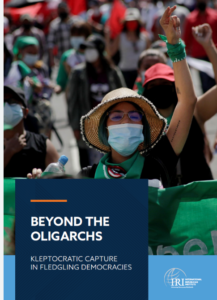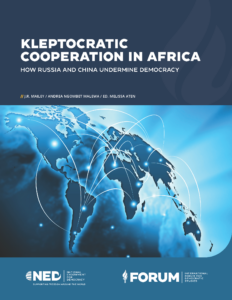
Bold investigative reporting, energetic civil society campaigns, and ambitious law enforcement actions have blown open the secretive world of global kleptocracy. Thanks to groups such as the International Consortium of Investigative Journalist (ICIJ) and the Organized Crime and Corruption Reporting Project (OCCRP), we possess a clearer understanding of the pervasive nature of this threat and the methods through which authoritarian regimes and their proxies can enable kleptocratic regimes, the International Republican Institute reports.
In 2020 IRI launched Transnational Responses Against Corruption and Kleptocracy (TRACK), an initiative to equip society, journalists, and government leaders around the world to support democratic institutions and fight elite corruption and state capture. In Panama, IRI supported Fundación Espacio Cívico (FEC) to produce an hour-long documentary with support from the National Endowment for Democracy (NED) titled “Kleptocracy: What Every Person Should Know (above). It’s an exciting film that explains how kleptocracy works, why people should care about it, and how to achieve change through advocacy efforts.
 The full documentary is available on YouTube (below) and has accumulated over 6,000 views to-date. Although the film is in Spanish, a trailer with English subtitles is available on FEC’s Twitter page. The documentary has received widespread media coverage in Panama, Latin America, and even Europe, including articles in La Prensa, Ellas, La Vanguardia, Yahoo News, and MiDiario, as well as interview and debate spots on national TV networks such as Telemetro and TVN.
The full documentary is available on YouTube (below) and has accumulated over 6,000 views to-date. Although the film is in Spanish, a trailer with English subtitles is available on FEC’s Twitter page. The documentary has received widespread media coverage in Panama, Latin America, and even Europe, including articles in La Prensa, Ellas, La Vanguardia, Yahoo News, and MiDiario, as well as interview and debate spots on national TV networks such as Telemetro and TVN.
In between autocracy and democratic consolidation, developing or fledgling democracies are permeated by kleptocratic networks in different ways, note analysts Eguiar Lizundia, Utpal Misra, Annelise Adrian, and Gillian Olortegui. Based on field research conducted in Central America and South Asia, Beyond the Oligarchs: Kleptocratic Capture in Fledgling Democracies identifies common features of kleptocratic governance in consolidating democracies as well as recommendations for international partners working towards supporting anti-kleptocracy reform in those jurisdictions, they write.
In kleptocratic systems, the instruments of the state are directed to shielding and enabling the corrupt activities of a small number of dominant power-holders, and independent groups or institutions are unable to hold these power-holders to account, the National Endowment for Democracy (NED) adds.
Moreover, kleptocracies are projecting influence beyond their national borders, often working to help bolster fellow kleptocratic autocrats and creating spillover effects that have a deeply corrosive impact on democratic standards and development, including in the countries where kleptocrats invest their ill-gotten wealth. The mechanics of transnational kleptocracy have become more sophisticated in the era of globalization, and it is now one of the major bulwarks of authoritarian systems.
That’s why NED is seeking a Director, Kleptocracy to lead its institutional strategy and integrated approach to grantmaking initiatives in this field, and help the NED family innovate in this complex fast-changing sphere.

On September 6 at 2:00 pm ET, the International Forum for Democratic Studies hosts an online discussion on how Russia and China support corrupt networks and leaders in Africa, drawing on findings from the Forum’s recent report.
IRI Supports Documentary Film in #Panama: “Kleptocracy: What Every Person Should Know”
“… bold investigative reporting, energetic civil society campaigns, and ambitious law enforcement actions have blown open the secretive world of global kleptocracy.”https://t.co/fL86n1NJHu
— IRI (@IRIglobal) August 23, 2023







